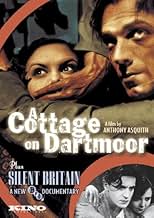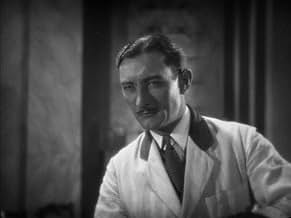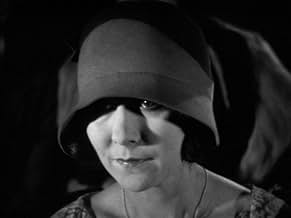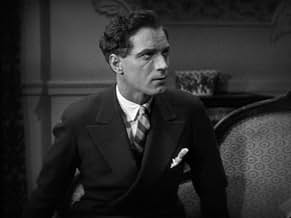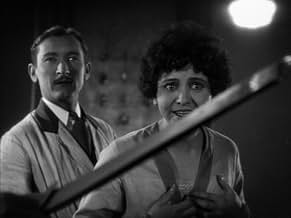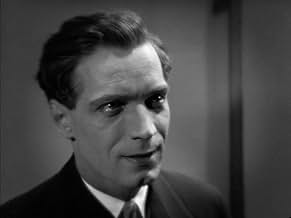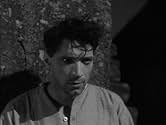A Cottage on Dartmoor
- 1930
- 1h 28min
VALUTAZIONE IMDb
7,5/10
1301
LA TUA VALUTAZIONE
Aggiungi una trama nella tua linguaA former barber escapes from a high security prison. Flashback story of an escape from the lonely, high-security Dartmoor Prison.A former barber escapes from a high security prison. Flashback story of an escape from the lonely, high-security Dartmoor Prison.A former barber escapes from a high security prison. Flashback story of an escape from the lonely, high-security Dartmoor Prison.
- Regia
- Sceneggiatura
- Star
Hans Adalbert Schlettow
- Harry - a Dartmoor Farmer
- (as Hans Schlettow)
Anthony Asquith
- Bespectacled Man in Cinema
- (non citato nei titoli originali)
Judd Green
- Customer
- (non citato nei titoli originali)
Recensioni in evidenza
10sunlily
A Cottage on Dartmoor is a late British silent of stunning clarity and poetic justice. The use of the camera to caress the homey accents in Norah's boarding house, the use of mirrors to dramatize the lives and thoughts of the characters, the elongated camera angles of the escaped convict jumping from captivity to freedom, and running from his past into redemption. All of this and more make this late silent itself almost a valentine to the end of the silent era and the dawn of sound.
One of the most poignant scenes in the movie demonstrates this by taking us to a "talkie" that nonetheless has a full orchestra that the camera hones in on and romanticizes.
While this is a tale of obsession, it is also a story of love that has many emotionally tense elements that Norah Baring and Uno Henning handle with dignity and grace. I'm very surprised that I've not heard more about either of these actors.
A Cottage on Dartmoor is a very beautifully realized film that probably wouldn't have been as effective had it been made as a sound movie.
One of the most poignant scenes in the movie demonstrates this by taking us to a "talkie" that nonetheless has a full orchestra that the camera hones in on and romanticizes.
While this is a tale of obsession, it is also a story of love that has many emotionally tense elements that Norah Baring and Uno Henning handle with dignity and grace. I'm very surprised that I've not heard more about either of these actors.
A Cottage on Dartmoor is a very beautifully realized film that probably wouldn't have been as effective had it been made as a sound movie.
Anthony Asquith is best known for straightforward film-making in the so-called British literary tradition which served him particularly well in stage-to-screen adaptations of G. B. Shaw & Terrence Rattigan. Letting the writer function as auteur doesn't win you critical kudos, but films as fine as PYGMALION/'38 and THE BROWNING VERSION/'51 don't just 'happen.' Even so, it's fun to watch the young Asquith show off, even needlessly, on late silents like this & UNDERGROUND/'28, also out on DVD. You can all but hear him parsing the latest Russian or German import just screened at his CineClub. There's some strikingly fast montage work and psychological P.O.V. stuff (even a shock-flash of red tinting as in the original prints of Hitchcock's SPELLBOUND/'45), but the main influence is UFA studios with their posh camera moves, rich visual texture, expressionist acting, shadowy lighting & diagonal slashes The opening works best as Swedish actor Uno Henning (in his only British role, he's an intriguing mix of Buster Keaton & Conrad Veidt) breaks out of prison in search of revenge. The story flashes back to detail a rather commonplace love triangle that gives Asquith plenty of space for his set pieces (a visit to the cinema, a very close shave, et al.) which tend to run on a bit too long. But no matter, it's all ravishing to watch and if the characterizations never quite add up, the visual touches are worth the stretch.
First time of viewing this one: a marvellous experience, from the opening shots of a prisoner on the run over moorland from prison guards to the ending where
The first intertitle is "Joe!" and we're immediately launched into an hour long flashback of how Joe got to be a prisoner and how he knows Sally. He's obsessively in love with her with awful consequences for the man she really loves, and himself - realistically portrayed and apart from the incident in the barbers unfortunately only too believable. The three main leads play their parts wonderfully well with incessant close ups, inventive photography, low cameras and precise mirror shots highlighting the intensity. Photogenic Norah Baring thankfully was no Hollywood Queen, her self possession and simple youthful homeliness adding an extra dimension to the time honoured tale. Favourite bits: Life in Sally's boarding house with the old biddies, ear trumpets and ancient furniture and plants; The cinema segment with everyone including the redundant pit orchestra intently watching a talkie, and of course the orgasmic psycho-jazz snappy editing; The "murder" in the barbers (it was fun watching everybody apparently just watching the dying man dying).
One of the last mainstream silent films produced, it just couldn't have worked even one year later as a slave to the voice this shows exactly what silent films could offer as an artform, and still do to those with a little patience. Try it.
The first intertitle is "Joe!" and we're immediately launched into an hour long flashback of how Joe got to be a prisoner and how he knows Sally. He's obsessively in love with her with awful consequences for the man she really loves, and himself - realistically portrayed and apart from the incident in the barbers unfortunately only too believable. The three main leads play their parts wonderfully well with incessant close ups, inventive photography, low cameras and precise mirror shots highlighting the intensity. Photogenic Norah Baring thankfully was no Hollywood Queen, her self possession and simple youthful homeliness adding an extra dimension to the time honoured tale. Favourite bits: Life in Sally's boarding house with the old biddies, ear trumpets and ancient furniture and plants; The cinema segment with everyone including the redundant pit orchestra intently watching a talkie, and of course the orgasmic psycho-jazz snappy editing; The "murder" in the barbers (it was fun watching everybody apparently just watching the dying man dying).
One of the last mainstream silent films produced, it just couldn't have worked even one year later as a slave to the voice this shows exactly what silent films could offer as an artform, and still do to those with a little patience. Try it.
I'm extremely impressed with every aspect of 'A Cottage on Dartmoor', directed by the underrated Anthony Asquith (son of the Prime Minister). The camera-work features some superb tracking shots, kept perfectly in focus by focus-puller Arthur Woods (later a brilliant director in his own right, all too briefly before his death in World War Two). There is a clever and subtle flashback transition. The frame compositions are excellent, as are the performances by this obscure cast. At the climax of this monochrome film, there is a single flash of red: Hitchcock would later use this same device in 'Spellbound'. I wonder if Hitchcock copied it from Asquith.
Most of this story takes place in flashback, a device which I normally dislike. Flashbacks are now so hackneyed that there is an entire cinematic grammar of flashbacks: the screen goes blurry, the soundtrack swells with theremin music. Here, the transition to flashback is done subtly, with the first dialogue intertitle bridging the shift. Well done!
Some minor details distressed me. We see a prisoner who escaped from Dartmoor. His uniform displays a number, but shouldn't it also have the broad arrow? Also, since Joe (the convict) has sworn revenge against Harry Stevens -- his rival for the affection of Sally -- why ever have Harry and Sally moved to a remote cottage on Dartmoor, conveniently close to Joe's prison? This is the sort of thing which Hitchcock identified as 'icebox logic', the cinematic equivalent of "esprit d'escalier".
This film was made at an awkward moment of cinema history. The movie is silent, yet (in the dialogue titles) the characters on screen discuss going to 'a talkie'. But when they go to the cinema, a live orchestra are playing ... which indicates that the movie being shown is a silent. And an insert shot of a programme book tells us that the movie is Harold Lloyd's 'Safety Last', definitely a silent.
Not the least of this film's pleasures is its depiction of life in George V's England. I got a twinge of nostalgia from a brief shot of an infant clutching a rusk. (Do modern babies eat rusks?) In the central role, Norah Baring is excellent: portraying a simple manicurist, she is personable and pleasant to look at, without the implausible amount of glamour that a Hollywood actress would have brought to such a workaday role. I'll rate this fine character drama 8 out of 10.
Most of this story takes place in flashback, a device which I normally dislike. Flashbacks are now so hackneyed that there is an entire cinematic grammar of flashbacks: the screen goes blurry, the soundtrack swells with theremin music. Here, the transition to flashback is done subtly, with the first dialogue intertitle bridging the shift. Well done!
Some minor details distressed me. We see a prisoner who escaped from Dartmoor. His uniform displays a number, but shouldn't it also have the broad arrow? Also, since Joe (the convict) has sworn revenge against Harry Stevens -- his rival for the affection of Sally -- why ever have Harry and Sally moved to a remote cottage on Dartmoor, conveniently close to Joe's prison? This is the sort of thing which Hitchcock identified as 'icebox logic', the cinematic equivalent of "esprit d'escalier".
This film was made at an awkward moment of cinema history. The movie is silent, yet (in the dialogue titles) the characters on screen discuss going to 'a talkie'. But when they go to the cinema, a live orchestra are playing ... which indicates that the movie being shown is a silent. And an insert shot of a programme book tells us that the movie is Harold Lloyd's 'Safety Last', definitely a silent.
Not the least of this film's pleasures is its depiction of life in George V's England. I got a twinge of nostalgia from a brief shot of an infant clutching a rusk. (Do modern babies eat rusks?) In the central role, Norah Baring is excellent: portraying a simple manicurist, she is personable and pleasant to look at, without the implausible amount of glamour that a Hollywood actress would have brought to such a workaday role. I'll rate this fine character drama 8 out of 10.
Uno Henning escapes from Dartmoor Prison and makes it to a small cottage where he confronts Norah Baring. We see in flashback that he worked in a barber shop and had a crush on Baring. After she (kind of) unintentionally leads him on, he discovers that she plans on marrying customer Hans Adalbert Schlettow. Bad things happen.
The last of four silent films made by Anthony Asquith, it was made so much on the cusp of talking films that the characters go see one in the film. It's a striking visual film with strong expressionist elements and odd, dynamic editing. It's also about 15 minutes too long.
Asquith cameos as a customer in the quite long movie theater scene.
The last of four silent films made by Anthony Asquith, it was made so much on the cusp of talking films that the characters go see one in the film. It's a striking visual film with strong expressionist elements and odd, dynamic editing. It's also about 15 minutes too long.
Asquith cameos as a customer in the quite long movie theater scene.
Lo sapevi?
- BlooperJoe's coworker reaches down to pick up the movie tickets with his right hand, but the close-up shows his left hand grabbing them.
- ConnessioniFeatured in Cinema Europe: The Other Hollywood (1995)
I più visti
Accedi per valutare e creare un elenco di titoli salvati per ottenere consigli personalizzati
Dettagli
- Tempo di esecuzione
- 1h 28min(88 min)
- Colore
- Mix di suoni
- Proporzioni
- 1.20 : 1
Contribuisci a questa pagina
Suggerisci una modifica o aggiungi i contenuti mancanti

